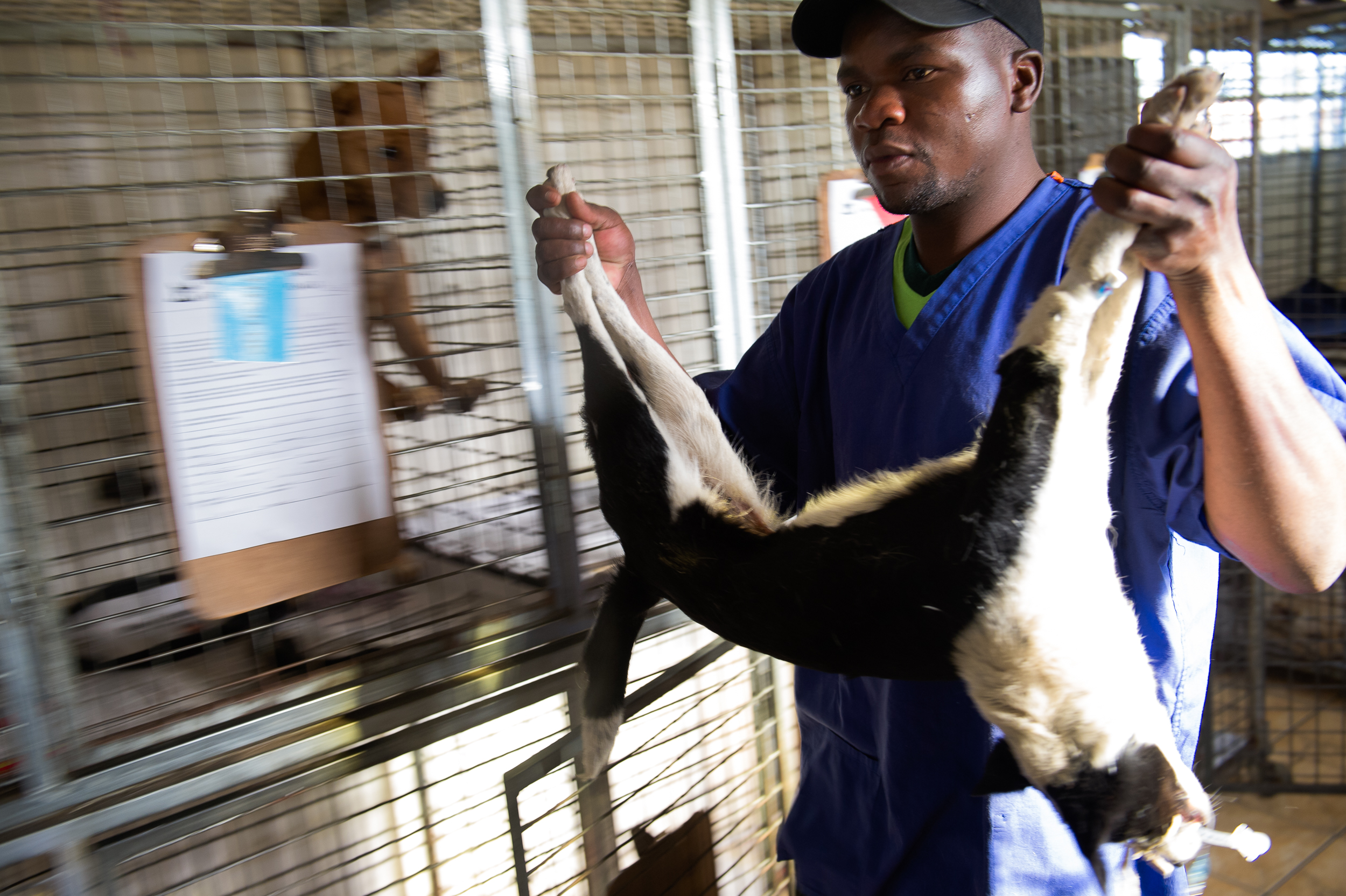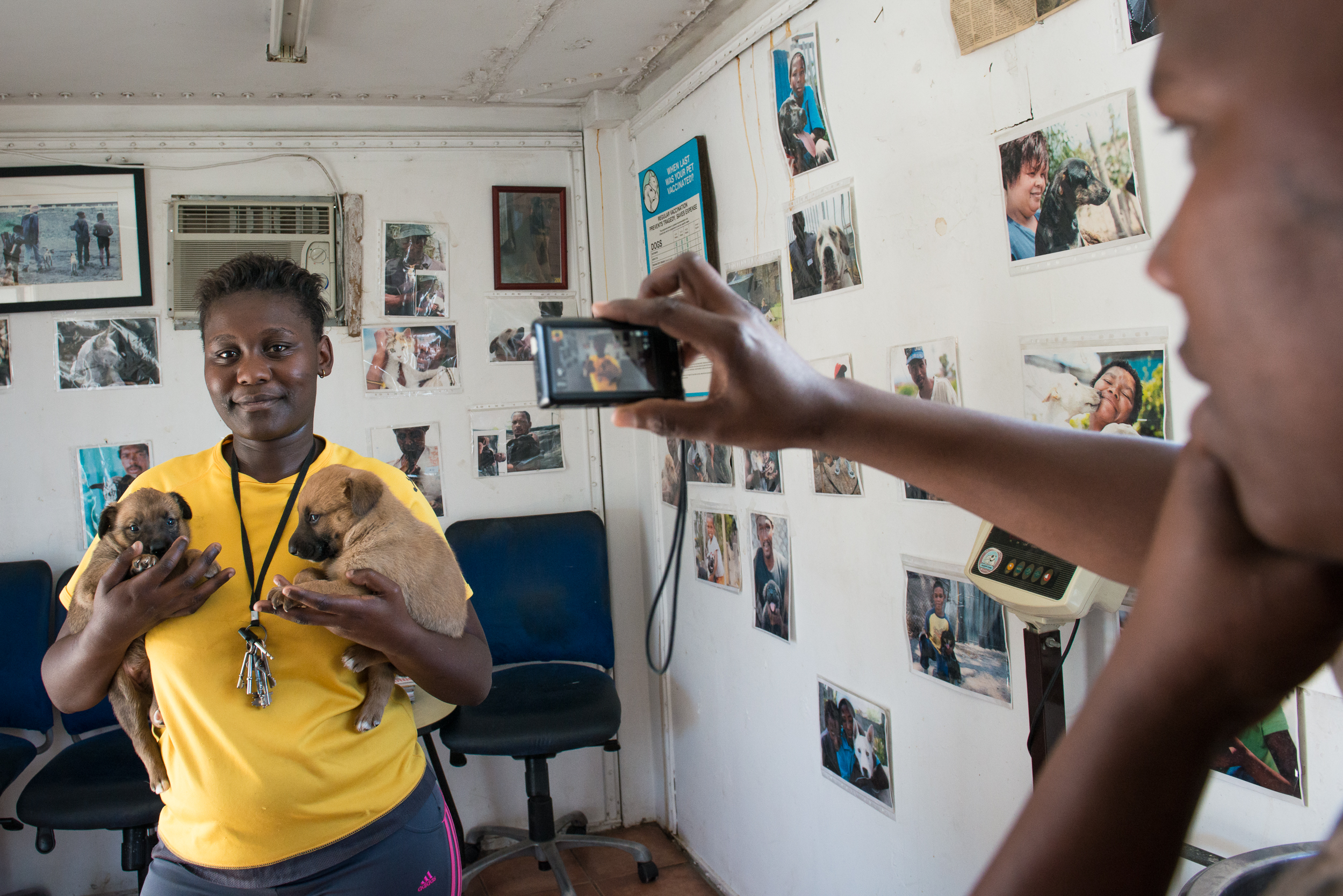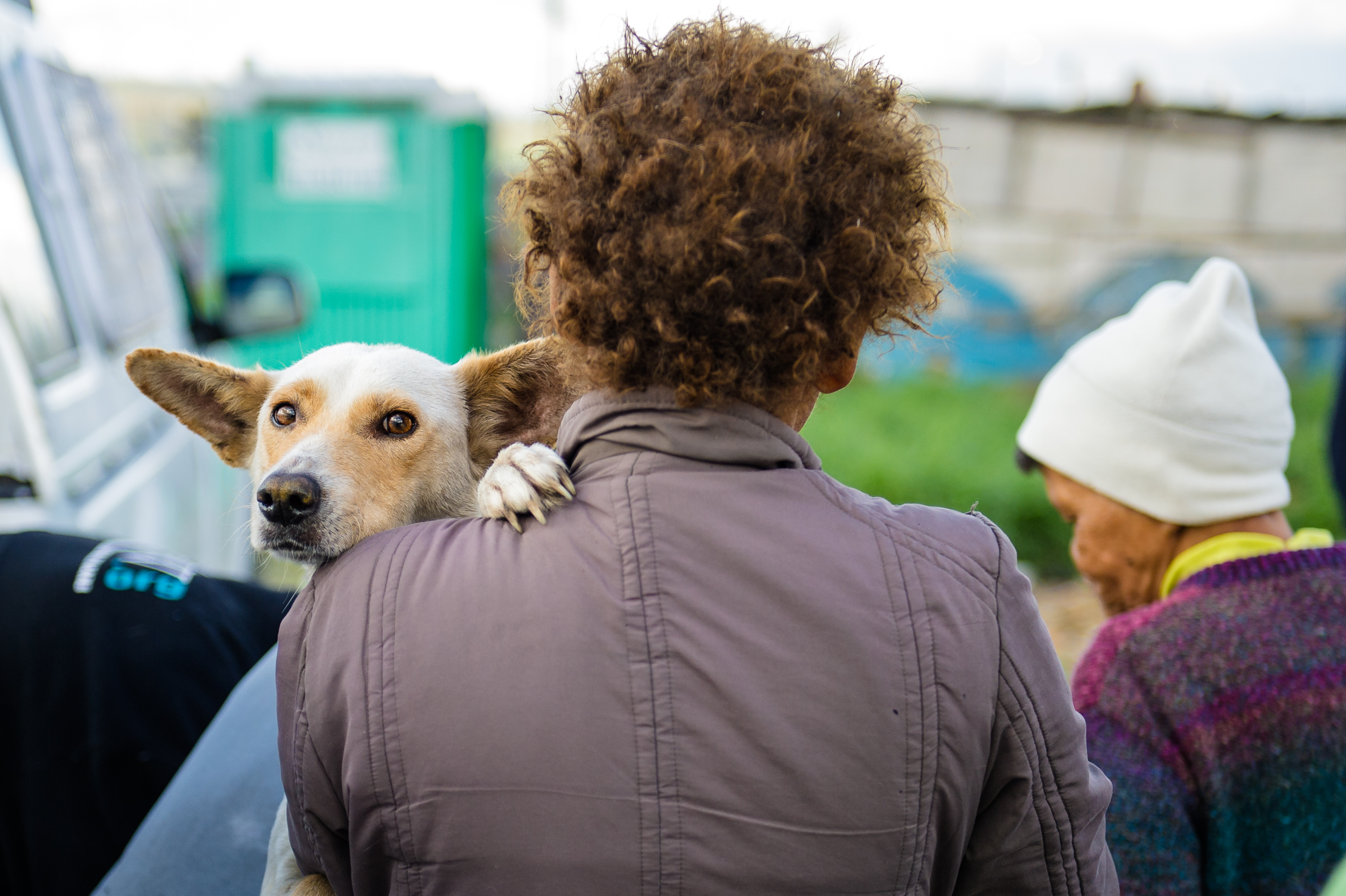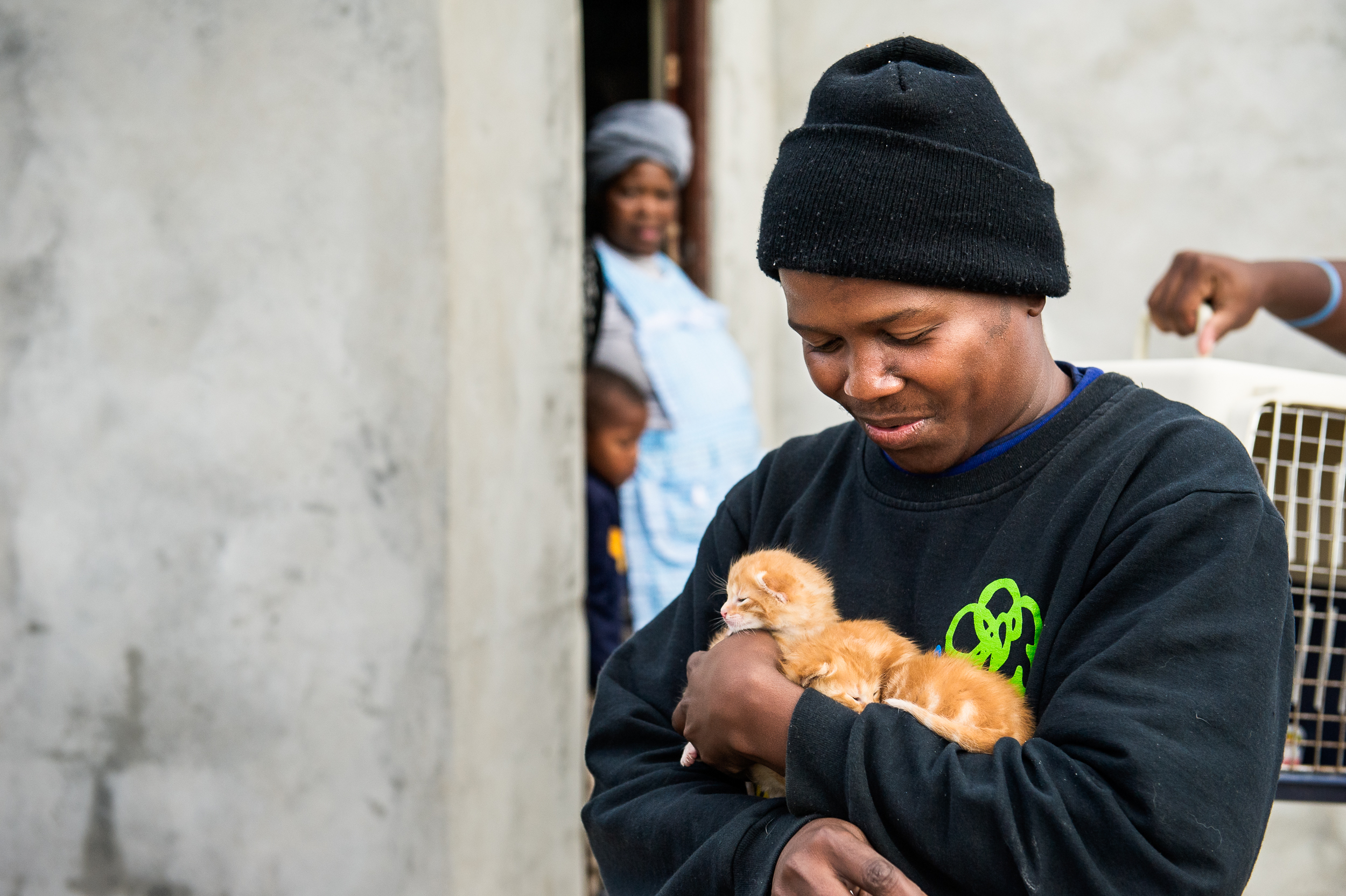
A dog stands guard outside of his home in Khayelitsha. Here, animals are often used to protect what little their owners have, rather than being treated as pets.

A resident cat sitting on the roof serves as the unofficial greeter at Mdzananda Animal Clinic.

Dr. Edson Man’Ombe, one of Mdzananda’s veterinarians, checks on Bones’s arthritic leg. Bones got her name because she was extremely emaciated when she was brought to the clinic last year. Now that she’s a well-fed permanent resident, Man’Ombe proposed that her name be changed to “Fat” instead.

Zen, a resident cat at the clinic, spends most of his time lounging around the charity shop. The store is run jointly by a local resident and Mdzananda, and sells pet necessities as well as second hand clothing and home goods.

Honest Dheya, an animal care worker, rushes an anesthetized dog in for surgery. While the veterinarian is working, the animal care workers are preparing the next animal for surgery. This perfectly timed ballet allows the team maximize the number of animals they treat each day.

Promise Tshayisa, one of the clinic’s animal care workers, begins treatment on a puppy that was rushed to Mdzananda after being hit by a car. Motor vehicle accidents are the single largest source of injury and death to pets in Khayelitsha.

The shipping container structures that house the clinic measure about 9 feet wide and 25 feet long. Mdzananda uses six of them to provide a cramped but functional space for surgery, kennels and animal quarantine.


The surgical table, sometimes covered in old newspapers as well as sterilized cloth, is set up by a window in the shipping container for better light.

Maria Limani prepares a dog to be neutered. Mdzananda runs a busy surgical unit that performs routine surgeries including approximately 150 sterilizations each month. Because spaying and neutering are so important to keeping the pet population in the township healthy, Mdzananda provides this service to residents free of charge.

Maria Limani, one of Mdzanada’s four animal care workers, monitors a dog’s breathing during surgery. Animal care workers attend to many of the day-to-day activities of the clinic including assessing patients, providing vaccinations, assisting in surgeries and providing rehabilitative care.

An anxious patient waits to be returned home to her loving owner.

A dog rescued by Mdzananda is taken to a specialist to be fitted for a customized wheelchair to help her walk. If a pet is injured but has a good chance at a successful recovery and a fulfilling life, the staff at Mdzananda rely on their connections in other communities to assist.

A ventilator keeps a dog in surgery breathing.

The staff keeps a careful accounting of the prescription drugs used in the surgical theater. Having enough medicine to treat the pets and conduct the surgeries is a continual concern for the clinic.

Tshayisa shares his afternoon snack with the clinic's resident dogs.

A local resident adopts two puppies. While Mdzanada isn't a pet adoption organization, animals are sometimes left at the clinic. Staff members work their neighborhood contacts to place animals in safe, permanent homes.

A local resident brings her dog to the clinic for a routine check-up. The clinic is beginning to see change in the way people interact with their pets. Outfitted with a proper leash and harness, this dog is the exception in Khayelitsha rather than the rule.

In the apartheid era, one of the many ways that the political establishment dehumanized people of color in the townships was by confiscating their pets. To avoid a scene, residents were often told that their dogs were being taken to be treated for an ailment or brought in for sterilization. But they were never returned creating an extreme distrust of anyone saying they want to take their dogs and cats.

Even in the new, relatively modern section of Khayelitsha, the concrete-block homes are tightly packed together.

A dog gives Lazola Sotywinga a friendly greeting. Sotywinga is an experienced animal care worker who has been at the clinic since the beginning when it was a flea dipping service run only on weekends.

Transportation to the clinic is an issue for most of Khayelitsha’s residents, especially if they have critically ill pets. These mobile units are designed to reach out to those who can’t access the physical clinic but they also build visibility and trust in the community.

A frightened dog waits in line for a check-up.

Sotywinga and the mobile team thrive on chatting up the residents, explaining the need for sterilization, bartering with free vaccinations and flea control treatments and one by one winning the trust of people who live far from the clinic itself.

Whenever the Mdzananda mobile clinic pulls into a neighborhood, it is instantly swamped. Areas that looked a little sleepy are jolted into motion and dogs and cats appear by the dozen.

With so many animals in close proximity to one another, the dogs in line for treatment can occasionally become cranky or territorial. The animal care workers move quickly to treat the pets and keep the peace.

A young girl waits to have her puppy vaccinated. The mobile clinic staff takes extra time to teach children about the proper care of pets.

There is really only one rule for the mobile clinic; the truck stays put until they run out of vaccines, usually after treating about 100 animals. This means that the wagon they use to transport pets back to the clinic for treatment or sterilization is full long before the medicines are gone.

Proper leashes are an uncommon site in Khayelitsha. Kids will try almost anything to keep their pet in line.

The mobile unit makes an unexpected stop so Sotywinga can talk with a family selling chickens on the side of the road. He believes that all animals, even those being sold for the evening’s dinner, deserve to be treated humanely. Because the birds were locked in the cages all day, they had no access to food or water. While Sotywinga has no official authority, he’s impressively effective by trading on goodwill, streetcred and the hope that people will do better if they know better.

Sotywinga scoops up a litter of kittens from a family that called Mdzananda.

With the mother cat gone, Sotywinga and the rest of the staff at Mdzananda took on the round-the-clock job of getting these kittens off to a healthy start.































